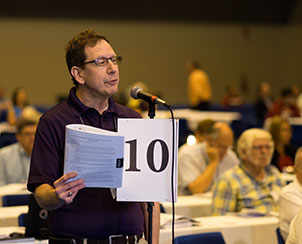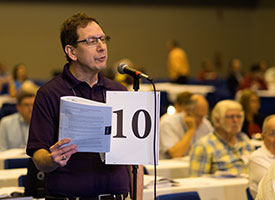By Melanie Ave
ST. LOUIS (July 25, 2013) — The residential seminary education program remains the “premier” path to office of the holy ministry and has “served the Synod as a wonderful blessing of Almighty God throughout her history.”

But delegates to the 65th Regular Convention of The Lutheran Church—Missouri Synod (LCMS) also affirmed another route to the pastoral office Thursday.
Delegates voted to continue and to strengthen the relatively new Specific Ministry Pastor (SM) distance-education program offered at both LCMS seminaries. They supported Resolution 5-04B with a vote of 803 to 151, an 84.2 percent majority.
Delegates also endorsed a second SMP resolution that creates an oversight committee and three additional resolutions offered by Floor Committee 5 on Seminary and University Education on the last day of the convention.
Delegates endorsed Resolution 5-03E — the fifth version of the SMP oversight resolution offered at the convention — with a 96.3 majority, 883 to 34.
The new oversight committee “provides a means to walk together on SMP and not travel divergent paths, while at the same time recognizing the healthy divergency between the two seminaries,” said committee Chairman Rev. Dale Sattgast. “It also keeps our seminaries, on the one hand, and our Synod, on the other hand, on the same page. There exists a wonderful cooperative spirit between our Synod’s two seminaries.
“For that we can all be most thankful to God.”
Resolution 5-04B does the following:
- Retains the SMP program.
- Affirms that SMP pastors are “properly called in accord with Article XIV of the Augsburg Confession.”
- Thanks Christ for specific ministry pastors and the investment by the seminaries.
- Asks the newly created SMP committee to address numerous concerns and questions about the program and to issue a report.
- Keeps the authority with the seminaries over the admission and administration of the SMP program.
- Keeps district presidents responsible for determining the appropriateness of the specific ministry sites that SMPs serve.
- Asks district presidents not to approve SMP sites “which could reasonably be expected to support a general pastor or sites where a minister of religion-commissioned could fulfill the duties pending reception of the recommendations from the SMP committee.”
- Asks congregations, districts and seminaries to encourage SMP pastors to engage in studies that lead to general pastor status.
- Keeps residential theological education as the “primary means” for training men for pastoral ministry in the Synod.
LCMS Pacific Southwest District President Rev. Dr. Larry Stoterau asked if district presidents were going to be trusted in their decision-making about specific ministries, to which Sattgast replied, “Yes.”
“There will not be someone second-guessing the district presidents’ decisions,” Sattgast said.
The LCMS convention first endorsed the four-year SMP program in 2007, creating a new category of clergy. Students complete their courses via distance education under the supervision of a pastor. They serve as vicars for the first two years and are eligible to receive a call to serve as an “SMP” at their vicarage site after their second year.
Once ordained, they complete the remaining courses in the final two years, but remain under pastoral supervision, as assigned by the district president, for as long as they serve as SMPs.
The two seminaries began offering SMP courses in 2008. The first cohorts to complete the program recently graduated.
Sattgast said the floor committee received an “incredible amount of input from many sources” on the SMP resolutions.
LCMS President Rev. Dr. Matthew C. Harrison asked for an SMP oversight resolution from the committee.
Sattgast said an oversight committee was “critically needed” since there is no formal SMP oversight listed in the Synod Bylaws or one created by prior conventions.
The approved oversight resolution requires the LCMS Chief Mission Officer, one representative from each seminary — chosen by the seminaries — and working in consultation with the Council of Presidents, to provide “leadership, coordination and oversight” for the program.
Sattgast, president of the LCMS South Dakota District, said he could not recall another resolution from previous conventions with so many different versions.
Both seminary presidents voiced their mutual support for the resolution.
“We both feel like … the seminaries themselves should fulfill the responsibilities spelled out in this resolution and that the seminaries be required to report to the church,” said the Rev. Dr. Dale A. Meyer, president of Concordia Seminary, St. Louis. He stood next to the Rev. Dr. Lawrence Rast, president of Concordia Theological Seminary, Fort Wayne, Ind., at the microphone, who said “amen” after Meyer spoke.
The convention approved all five resolutions presented Thursday from the higher-education floor committee.
In one of the more narrow votes during the convention, with 590 in favor and 382 delegates opposed — a 60.7 percent majority — delegates approved Resolution 5-11B. The resolution calls for amending Bylaw 3.10.4.7.3 and grants the Synod prior approval for the appointment of seminary faculty.
The Synod president, LCMS Board for National Mission chairman and LCMS Council of Presidents chairman would conduct a “thorough theological review” of new faculty members and only those approved by the three-member group would be eligible to be called as new faculty member by the seminaries.
Sattgast said the resolution would return prior approval to the Synod bylaws, which existed from the 1950s until 2010, when the convention adopted massive restructuring and eliminated the prior approval process from the bylaws.
The Rev. Jeremy Jacoby, pastor of Summit of Peace Lutheran Church in Thornton, Colo., spoke against the resolution, saying he would like to see more involvement by the laity and parish pastors.
“What I believe to be an unfortunate event has taken place over the last few days here as this assembly seems to have continually given its oversight and authority away from its congregations and laypeople and passed it up the chain of command, so to speak,” he said. “While that is not a referendum, by any means, on this administration or any previous ones or any future one, I think we are better served in the church to continue to let God’s laypeople participate in this event.”
The convention applauded.
Harrison, speaking from the floor, told the delegates that prior approval has “served our Synod well for 60 years.
“I know it’s painful sometimes but institutions float away from church bodies,” he said. “This allows the institutions and the church body to work together to keep institutions and church leadership on the same page.”
In an earlier discussion on the resolution during the convention, Sattgast told the delegates that a “difference of opinion” remains with at least one of the seminaries on the issue. But he said the presidents from each seminary told him they could live with whatever the convention decides.
Before the convention, Meyer sent a letter to delegates opposing the resolution, Sattgast said. Rast, president of Concordia Theological Seminary in Fort Wayne, sent a letter of support to the floor committee, he said.
Other Floor Committee 5 resolutions approved Thursday were:
- Resolution 5-13A, approved by an 85.9 percent majority, calls for ministers of religion to “strongly encourage” high-caliber candidates for service in pastoral ministry.
- Resolution 5-14A, endorsed by an 85.3 percent majority, requests a study of the alternate routes to pastoral ministry. A report is required from a task force to the president by the end of 2015.
Harrison thanked Sattgast for his service to the committee, despite being recently diagnosed with a non-malignant, untreatable brain tumor that causes constant headaches.
“To see a brother in Christ, who at one point thought he was going to have to leave the floor committee, but to see him given the stamina and the courage and the strength by God to continue on … is a humbling blessing for us all,” Harrison said. “We thank God for you, Dale.”
The convention gave Sattgast a standing ovation.
As the floor committee prepared to exit the stage, LCMS Texas District President Rev. Kenneth M. Hennings led the delegates in a prayer for Sattgast, asking God to anoint him with the Spirit’s power and healing and peace and saying, “You are with him.”
